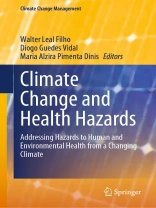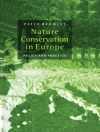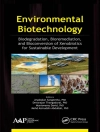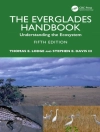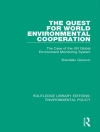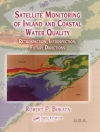This book contains a set of papers which explore the links among climate change, health, and hazards and demonstrate how they interact. It emphasizes the urgency of immediate and more ambitious action to address climate risks. According to the Intergovernmental Panel on Climate Change (IPCC), human-induced climate change is known to be causing dangerous and widespread disruptions in nature and is affecting the lives of billions of people around the world, despite efforts to reduce the risks. Climate change is also negatively influencing health and is mounting threat to our wellbeing and a healthy planet.
The world is also facing significant climate hazards over the next two decades, with global warming expected to soon reach 1.5°C. Even temporarily exceeding this warming level will result in additional severe impacts, some of which may be irreversible. There is therefore a perceived need for publications which may foster a greater understanding of how climate changeconnects to human health and the role played by hazards in this context. It is against this background that this book is being prepared.
İçerik tablosu
Preface.- Part1. THEORETICAL APPROACHES TO CLIMATE CHANGE IMPACTS ON HUMAN AND ENVIRONMENTAL HEALTH .- 1. Thinking beyond borders: how can humanities and social sciences help to deal with climate change health hazards in the XXI century? Outputs of the transdisciplinary network “Composing worlds: humanities, well-being and health”.- 2. Climate Change and Health: Essay on the Limits of Naturalism.- 3. Mental health, well-being and climate change: scope and challenge.- 4. Climate change impact on mental health: Is nature fighting us back?.- Part 2. CLIMATE CHANGE IMPACTS ON HUMAN AND ENVIRONMENTAL HEALTH.- 5. Industrial waste management in Ghana: environmental challenges and climate change impacts on human health.- 6. Climate change and transmissible diseases.- 7. What will be the most critical driver of population dynamics: climate change, the COVID-19 pandemic, or both?.- 8. The impacts of climate change on human wellbeing in the municipality of Porto – an analysis based on remote sensing.- 9. The impact of climate change on water resources and human health – examples from Croatia and Bosnia and Herzegovina.- 10. Unawareness about vector-borne diseases among citizens as a health risk consequence of climate change – a case study on leishmaniosis in Northwest Portugal.- 11. Climate change and the increase in disasters related to hydrometeorological and climatic events in Mexico: main impacts on the population.- 12. Climate change and mental health in Bangladesh: a cultural variability perspective.- 13. Impacts of Climate Change on agriculture and food security in Africa and Latin America and the Caribbean.- 14. Gender gaps in food security in Mexico, in the context of a changing environment.- 15. Assessing the climate change-related health hazards in Africa.- Part 3. CLIMATE RESILIENCE AND ADAPTATION TO CLIMATE CHANGE.- 16. Do the Resilience and Adaptive Capacity to Climate-Related Disasters Help Explain Human Health and Well-being?.- 17. EU funding to promote climate change adaptation and risk prevention and management in Portugal: potential effects on mitigating health hazards.- 18. Increasing Healthcare Facilities Resilience to Hazards Resulting from Climate Change.- 19. Climate change and health Hazards: Mitigation Roles of public sectors (Ministry, Department & Agencies).- 20. Changing fertility, child mortality and contraceptive prevalence rates in Bangladesh: effects of disaster risk reduction and family planning programs.- 21. Climate change and humanitarian responses: a proposal of education for health hazards preparedness.- 22. Effectiveness of public policy in the face of climate change: the case of coffee growing in the state of Chiapas – Mexico.- 23. The Role of Education and Research in Human and Planetary Health
